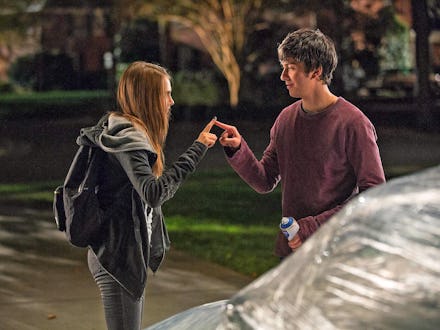'Paper Towns' Deconstructs How We Talk About the "Manic Pixie Dream Girl" Movie Stereotype

Margo Roth Spiegelman is a fantasy. The love interest (played by Cara Delevingne) in John Green's novel Paper Towns, and in its film adaptation in theaters now, is purposefully designed as more of an idea than a person. She's a whimsical young woman, full of big ideas about the world and the tendency to disappear on a whim. She's quirkily and often referred to by her full name; Margo Roth Spiegelman, a fancifully named dream.
Indeed, Margo has been called a deconstruction of the Manic Pixie Dream Girl trope, defined by critic Nathan Rabin as a female character who "exists solely ... to teach broodingly soulful young men to embrace life and its infinite mysteries and adventures." Green himself declared her a deconstruction in a 2008 blog post, saying protagonist Quentin Jacobsen (Nat Wolff) only sees Margo as such. That differs from her being one. She doesn't exist just for him.
But Margo Roth Spiegelman isn't the real deconstruction in Paper Towns. Quentin's love of the MPDG trope is.
Note: Spoilers for Paper Towns follow.
Paper Towns gets its name from the fictional cities with which Margo is obsessed. As defined in the movie, they're fake towns printed on maps designed to identify copyright infringement. Margo sees the term a bit more broadly — she thinks fakeness permeates real cities, like their home. She sees herself as just as fake as they are.
That's what Quentin sees her as too, though he doesn't realize it. He says he's in love with Margo at first sight. Despite not speaking to her for nine years, he goes out to commit several crimes with her one night. After she disappears to a paper town in New York, he follows her clues and then hauls up the East Coast, friends in tow.
When he finds her, Quentin is dismayed that she wasn't leaving him clues to come find her. Margo was off on her own journey. He didn't factor into her plans. She was more than a MPDG.
Then the movie makes a hard turn right back into the trope.
On the road trip up to find her, Quentin shares memories with friends old and new. His two best friends, Ben and Radar, came along to have one last trip with their friend before they graduated high school and went their separate ways. Each bonds with a different young woman — Radar's girlfriend Angela and Margo's best friend Lacey. Their stories, which form the bulk of the movie's second act, are far more interesting than Quentin and Margo's.
Yet Quentin learns nothing from them. When they reach New York and don't immediately find Margo, he tells them their trip was worthless if he doesn't find her, then urges them to go home without him. Over a MPDG, he's willing to toss everything away. Instead, Margo has to be the one to push him back home.
Margo Roth Spiegelman is a MPDG, not a deconstruction. She teaches Quentin to live life to its wildest, fullest extremes. We don't learn about her goals because she doesn't have any; she doesn't even know who she is. She's content with floating until she figures it out. She's basically the textbook definition of a MPDG.
Margo Roth Spiegelman is the textbook definition of a Manic Pixie Dream Girl, not a deconstruction.
It's Quentin — and, by extension, the audience — who learns a hard lesson about loving an idea. He nearly loses his true friends over a girl he doesn't understand. He's a cautionary tale for every person who falls in love with a dream instead of a reality.
There are issues with Paper Towns that keep this bit of education from being as effective as it could be. Quentin never really seems to be in danger of losing his friends; they accept him back literally wordlessly. He shrugs at them at prom, the living embodiment of a shrug emoticon, and they dance together to Haim's "Falling." More problematically, Quentin is the least interesting character in his own story. It's hard to feel much for a character with no motivation behind "find the love of my life I know literally nothing about."
Still, despite the weakness of Paper Towns' narrative, the lesson remains an important one. People are not distillations of feelings or thoughts. The people we fall for are as complex as we are. They do not exist for us. They exist for themselves.